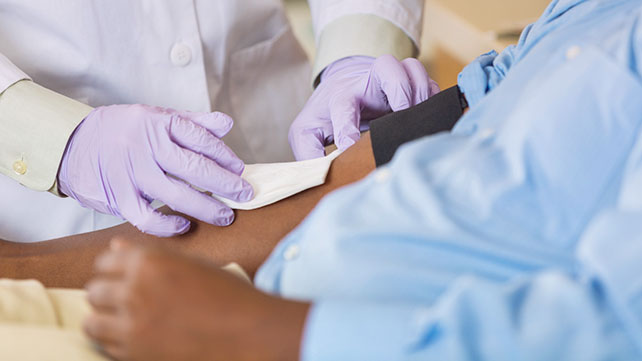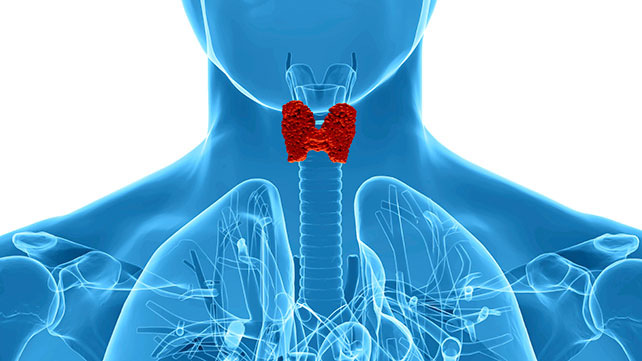
Hypothyroidism treatment typically starts with taking replacement thyroid hormone, but it doesn’t end there. You also need to watch what you eat. Sticking to a healthy diet can prevent the weight gain that often comes with having an underactive thyroid. Avoiding certain foods can help your replacement thyroid hormone work as well as it should.
Here’s a look at some foods to add to or remove from your hypothyroidism diet plan.
What to eat
There is no specific hypothyroidism diet. Eating a low-fat diet with a good balance of fruits, vegetables, lean protein (fish, poultry, lean meat), dairy, and whole grains is a good strategy for everyone to follow.
You also want to balance your calorie intake. Portion control is essential to preventing weight gain. Hypothyroidism slows your metabolism, and you can put on a few pounds unless you burn off more calories than you take in each day. Talk to your doctor or work with a dietitian to figure out how many calories you should eat each day, and what foods will help you feel your best.
What to limit or avoid
Hypothyroidism does come with a few dietary restrictions. First, you’ll want to avoid high-fat, processed, and sugary foods that can contribute to weight gain. Also limit salt to no more than 2,300 milligrams daily. Too much salt can raise your blood pressure, which is already a risk when your thyroid is underactive.
Here are a few foods to limit or avoid, because they can affect how well your thyroid gland or your thyroid replacement hormone works.
Iodine
Your thyroid needs iodine to make its hormones. Though your body doesn’t make this element, it’s found in a variety of foods, including iodized table salt, cheese, fish, and ice cream. If you eat a normal diet, you shouldn’t become deficient in iodine.
Yet you don’t want to eat too much, either. Taking iodine supplements or eating too many foods that contain iron can lead to hyperthyroidism — an overactive thyroid gland. Also avoid supplements that contain kelp, a type of seaweed that’s high in iodine.
Soy
Soy-based foods like tofu and soybean flour are high in protein, low in fat, and rich in nutrients. However, they also contain the female hormone estrogen, which could interfere with your body’s absorption of synthetic thyroid hormone.
Though you don’t need to stop eating soy entirely, your doctor might recommend that you limit the amount you eat, or adjust when you eat it. Wait at least four hours after taking your hypothyroidism medicine before consuming any soy foods.
Fiber
Too much fiber can interfere with the absorption of your thyroid hormone medicine. Current dietary recommendations call for 25 grams of fiber daily for women, and 38 grams for men. Ask your doctor or dietitian how much you should eat each day.
Don’t stop eating fiber entirely — it’s found in healthy foods like fruits, vegetables, beans, and whole grain breads and cereals. Just don’t overdo it. And wait a few hours after taking your thyroid medicine before you eat high-fiber foods.
Cruciferous vegetables
Brussels sprouts, broccoli, and cabbage are part of the cruciferous family of vegetables. These vegetables are high in fiber and vitamins, and they may help protect against cancer and other diseases. Cruciferous vegetables have been linked to hypothyroidism — but only when eaten in very large amounts. If you make them just one part of a wide variety of vegetables in your diet, they shouldn’t be a problem.
Alcohol
Alcohol doesn’t interact with levothyroxine, but if you drink too much, it can damage your liver. Because your liver breaks down drugs like thyroid hormone to remove them from your body, alcohol-induced liver damage could lead to too much levothyroxine in your system. Check with your doctor to see whether it’s safe for you to have alcohol, and how much you can drink.
Gluten
Gluten — the protein found in grains like wheat, rye, and barley — doesn’t directly affect thyroid function. Yet some people with autoimmune hypothyroidism also have celiac disease, a condition in which their immune system mistakenly attacks their small intestine after they eat gluten.
If you have symptoms like abdominal bloating, stomachache, diarrhea, and vomiting after you eat foods containing gluten, see your doctor for a celiac blood test. Eliminating gluten from your diet should relieve these symptoms.
Iron and calcium
Both of these minerals can interfere with the absorption of your thyroid hormone medicine. While foods containing iron and calcium are safe to eat, avoid them in supplement form.
Planning your diet
When you have a chronic condition like hypothyroidism, don’t try to navigate your diet alone. Start with a visit to your doctor, who can help you identify which foods might cause interactions or other problems with your thyroid medicine. Then work with a dietitian, who can help you develop a diet that’s both healthy and thyroid friendly.
Read more in Hypothyroidism ResourcesChronic Conditions Team. (2014, September 23). Thyroid issues: What you need to know about diet and supplements. Retrieved from https://health.clevelandclinic.org/2014/09/thyroid-issues-what-you-need-to-know-about-diet-and-supplements/
Freeman, H. J. (2016, October 14). Endocrine manifestation in celiac disease. World Journal of Gastroenterology, 22(38), 8472-8479. Retrieved from https://www.ncbi.nlm.nih.gov/pmc/articles/PMC5064028/
Iodine deficiency. (n.d.). Retrieved from http://www.thyroid.org/iodine-deficiency/
Larson, H. (2016, September 27). Easy ways to boost fiber in your daily diet. Retrieved from http://www.eatright.org/resource/food/vitamins-and-supplements/types-of-vitamins-and-nutrients/ways-to-boost-fiber
Messina, M., & Redmond, G. (2006, March). Effects of soy protein and soybean isoflavones on thyroid function in healthy adults and hypothyroid patients: A review of the relevant literature [Abstract]. Thyroid, 16(3), 249-258. Retrieved from https://www.ncbi.nlm.nih.gov/pubmed/16571087
Nippoldt, T. B. (2016, August 23). Hypothyroidism diet: Can certain foods increase thyroid function? Retrieved from http://www.mayoclinic.org/diseases-conditions/hypothyroidism/expert-answers/hypothyroidism-diet/faq-20058554
Nippoldt, T. B. (2016, October 14). Is it true that people with hypothyroidism should avoid soy? Retrieved from http://www.mayoclinic.org/diseases-conditions/hypothyroidism/expert-answers/hyperthyroidism/faq-20058188
Thyroid and diet factsheet [Fact sheet]. (n.d.). Retrieved from http://www.btf-thyroid.org/information/108-thyroid-and-diet-factsheet
Thyroid gland: Frequently asked questions. (n.d.). Retrieved from http://endocrinediseases.org/thyroid/faq.shtml
What is celiac disease? (n.d.). Retrieved from https://celiac.org/celiac-disease/understanding-celiac-disease-2/what-is-celiac-disease/



